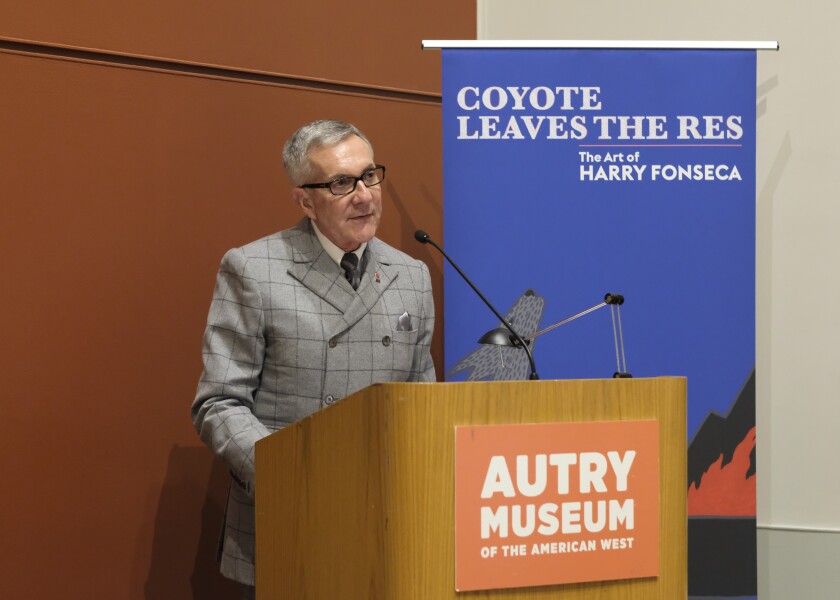When Gene Autry’s Western Heritage Museum opened in November 1988, its exhibitions included a collection of Colt firearms, a saddle that belonged to Buffalo Bill Cody and works by Western landscape painters including Albert Bierstadt and Thomas Moran. One of the galleries was named “Spirit of Conquest.”
A lot has changed at the Autry, now known as the Autry Museum of the American West.
In 2003, the museum merged with the Southwest Museum of the American Indian, giving the institution one of the great collections of Indigenous artifacts in the U.S. Over the ensuing years, the Autry has continued to expand the themes it addresses. This includes exhibitions devoted to important contemporary Indigenous artists such as Rick Bartow and Harry Fonseca as well as a 2018 show that explored the archives of the Chicano activist newspaper “La Raza,” organized in collaboration with UCLA’s Chicano Studies Research Center.
Overseeing some of those changes has been the museum’s president and CEO, W. Richard West, Jr., 78, who has led the Autry for close to a decade.
“In fairness to the Autry, it was happening before I got here,” he says of the museum’s evolution. “Gene and Jackie [Autry’s] conception of the museum was far beyond a cowboy museum. … I have tried along with others, the staff and the board of trustees, to make that stamp of diversity more structural and more prominent.”

Rick West speaks at the opening of “Coyote Leaves the Res: The Art of Harry Fonseca,” in May 2019.
(Jack Bohlka)
Now West, who often goes by the more informal Rick West, is set to retire Wednesday — marking another moment of transition. (Succeeding him will be Stephen Aron, a UCLA historian who has long been involved with the Autry.)
A citizen of the Cheyenne and Arapaho Tribes, West was born in San Bernardino, raised in Oklahoma and initially worked as a lawyer. But in his 40s, he made the shift to museums, becoming the founding director of the Smithsonian’s National Museum of the American Indian in Washington, D.C. in 1990. (He was there until 2007.)
He joined the Autry at the tail end of 2012 and in his time there has been instrumental in hiring curators such as Joe D. Horse Capture and Tyree Boyd-Pates, known for their community-minded methods of curation. He has also seen to fruition the construction of a 100,000-square-foot resources center in Burbank that will not only serve as an important site of collections care and study but function as a space in which members of Indigenous communities can stage ceremonies. (It is scheduled to open to the public next year.)
In this conversation, edited for length and clarity, West took time out of his frantic final days at the Autry to chat about what’s changed in the relationship between Native Americans and museums, why he wanted dirt floors in one of the NMAI’s buildings, and how his artist father helped shape his view of art.
appId : '134435029966155',
xfbml : true, version : 'v2.9' }); };
(function(d, s, id){ var js, fjs = d.getElementsByTagName(s)[0]; if (d.getElementById(id)) {return;} js = d.createElement(s); js.id = id; js.src = "https://connect.facebook.net/en_US/sdk.js"; fjs.parentNode.insertBefore(js, fjs); }(document, 'script', 'facebook-jssdk'));
Stay connected with us on social media platform for instant update click here to join our Twitter, & Facebook
We are now on Telegram. Click here to join our channel (@TechiUpdate) and stay updated with the latest Technology headlines.
For all the latest Entertainment News Click Here
For the latest news and updates, follow us on Google News.
